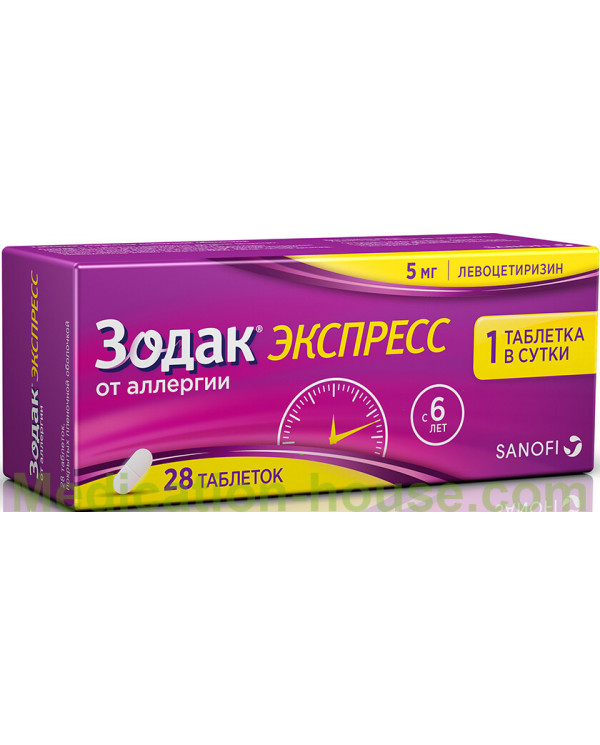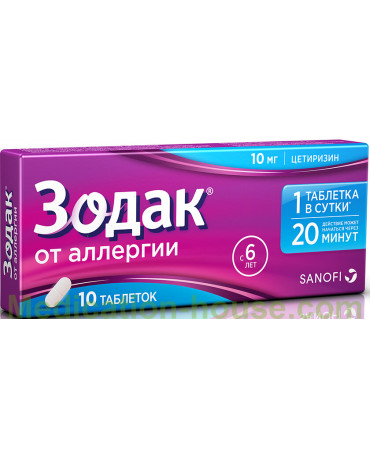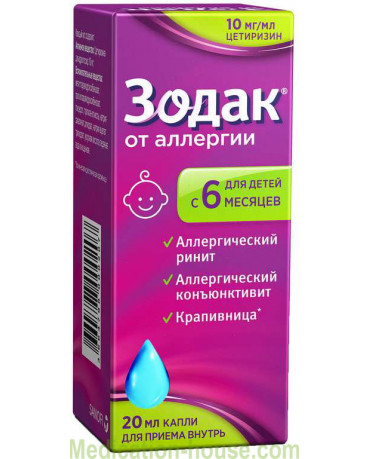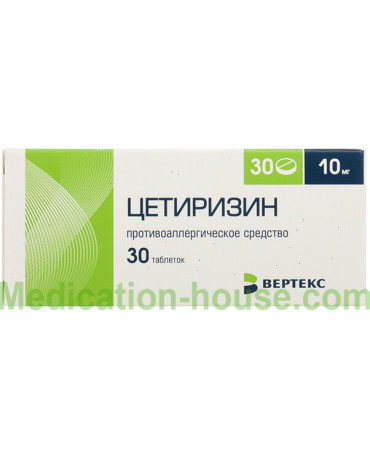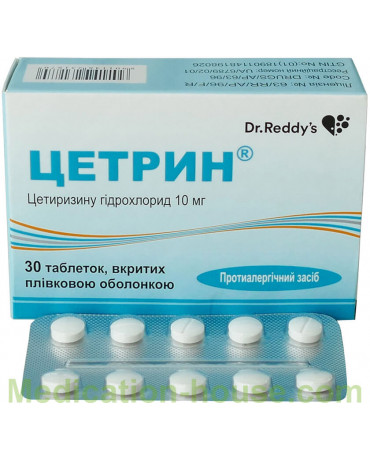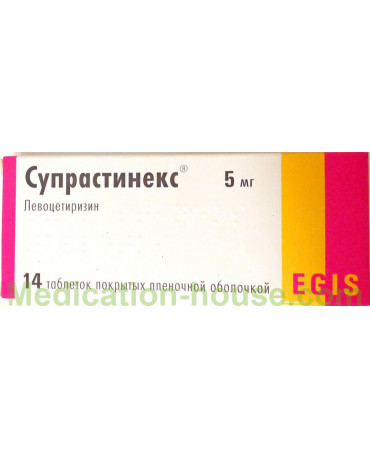Zodac Express instruction
You can buy Zodac Express here
Composition
1 tablet contains:
Active ingredient: levocetirizine dihydrochloride - 5.00 mg.
Excipients:
core: lactose monohydrate, microcrystalline cellulose, sodium carboxymethyl starch, colloidal silicon dioxide, magnesium stearate;
film coating: hypromellose 2910/5, macrogol - 6000, talc, titanium dioxide E171.
Description
Oblong biconvex tablets, film-coated, white or almost white, engraved with “e” on one side.
Pharmacotherapeutic group
Antiallergic - H1-histamine receptor blocker.
Pharmacodynamics
Levocetirizine - the active substance of Zodac Express - is the R-enantiomer of cetirizine, a powerful and selective histamine antagonist, which blocks the H1-histamine receptors.
Levocetirizine affects the histamine-dependent stage of allergic reactions, and also reduces the migration of eosinophils, reduces vascular permeability, and limits the release of inflammatory mediators.
Levocetirizine prevents the development and facilitates the course of allergic reactions, has antiexudative, antipruritic action, practically does not have anticholinergic and antiserotoninovogo action. In therapeutic doses, almost no sedative effect.
After ingestion, the anti-allergic effect of levocetirizine continues for 24 hours.
Pharmacokinetics
The pharmacokinetic parameters of levocetirizine vary linearly and are practically the same as cetirizine pharmacokinetics.
Suction
After ingestion, Zodac Express is rapidly and completely absorbed from the gastrointestinal tract. Meal does not affect the completeness of absorption, although its rate decreases. In adults, after a single dose of the drug in a therapeutic dose (5 mg), the maximum concentration (Cmax) in the blood plasma is reached after 0.9 h and is 270 ng / ml, after repeated administration at a dose of 5 mg - 308 ng / ml. Equilibrium concentration is reached after 2 days.
Distribution
Levocetirizine is 90% bound to plasma proteins. The volume of distribution (Vd) is 0.4 l / kg. Bioavailability reaches 100%.
Metabolism
In small quantities (<14%), levocetirizine is metabolized in the body by N- and O-dealkylation (unlike other H1-histamine receptor antagonists, which are metabolized in the liver using a cytochrome system) to form a pharmacologically inactive metabolite.
Due to the insignificant metabolism and lack of metabolic potential, the interaction of levocetirizine with other drugs seems unlikely.
Removal
In adults, the half-life (T1 / 2) is 7.9 ± 1.9 h; in small children T1 / 2 shortened. In adults, the total clearance is 0.63 ml / min / kg. About 85.4% of the dose of Zodac Express is excreted by the kidneys unchanged by glomerular filtration and tubular secretion; about 12.9% through the intestines.
Pharmacokinetics in Special Patient Groups
Patients with renal failure
In patients with renal insufficiency (creatinine clearance (CC) <40 ml / min), the clearance of Zodac Express decreases and T1 / 2 lengthens (for example, in patients on hemodialysis, the total clearance decreases by 80%), which requires a corresponding change in the dosage regimen . Less than 10% of levocetirizine is removed during standard 4-hour hemodialysis.
Children
Data on the study of the pharmacokinetics of Zodac Express in 14 children aged 6 to 11 years old weighing from 20 to 40 kg with an oral dose of 5 mg of levocetirizine once showed that Cmax and area under the curve (AUC) are approximately twice as high as healthy adults under cross-control. The average Cmax was 450 ng / ml, the maximum concentration was reached after an average of 1.2 hours, the total clearance with regard to body weight was 30% higher, and the half-life was 24% shorter in children than the corresponding figures in adults. A retrospective pharmacokinetic analysis was performed in 324 patients (children aged 1 to 11 years and adults aged 18 to 55 years) who received one or more doses of levocetirizine from 1.25 mg to 30 mg. The data obtained during the analysis showed that taking Zodac Express at a dose of 1.25 mg in children under the age of 5 years leads to a plasma concentration corresponding to that in adults when taking 5 mg of the drug once a day.
Elderly patients
Data on pharmacokinetics in elderly patients is limited. With repeated intake of 30 mg of levocetirizine once a day for 6 days in elderly patients (age 65 to 74 years), the total clearance was approximately 33% lower than that in adults of younger age. It has been shown that the distribution of cetirizine racemate is more dependent on renal function than on age. This statement can also be applied to levocetirizine, since both drugs and levocetirizine and cetirizine are mainly excreted in the urine. Therefore, in elderly patients, the dose of levocetirizine should be adjusted depending on the renal function.
Indications for use
Treatment of symptoms of year-round (persistent) and seasonal (intermittent) allergic rhinitis and allergic conjunctivitis, such as itching, sneezing, nasal congestion, rhinorrhea, tearing, conjunctival hyperemia;
pollinosis (hay fever);
urticaria (including chronic idiopathic urticaria);
other allergic dermatosis, accompanied by pruritus and rash.
Contraindications for Zodac Express
Hypersensitivity to levocetirizine, cetirizine, hydroxyzine, and other piperazine derivatives or to any of the auxiliary components of Zodac Express;
terminal stage of renal failure (CC less than 10 ml / min);
age up to 6 years (for this dosage form);
congenital intolerance to galactose, lactase deficiency or malabsorption of glucose - galactose (due to the content of lactose in the preparation).
Carefully
Chronic renal failure (requires dosing regimen adjustment);
in elderly patients (with age-related decrease in glomerular filtration rate);
in patients with predisposing factors for urinary retention (spinal cord injury, prostatic hyperplasia, etc.);
chronic liver disease (hepatocellular, cholestatic or biliary cirrhosis) (dose adjustment is required only with a concomitant decrease in glomerular filtration rate);
simultaneous use with alcohol (see the section "Interaction with other drugs");
during pregnancy and during breastfeeding.
Use during pregnancy and during breastfeeding
Pregnancy
Data on the use of levocetirizine during pregnancy is practically absent or limited (less than 300 outcomes of pregnancies). However, the use of cetirizine, the racemate of levocetirizine, during pregnancy (more than 1000 outcomes of pregnancies) was not accompanied by developmental defects and fetal and neonatal toxic effects. In animal studies, no direct or indirect adverse effect on pregnancy, fetal and fetal development, childbirth and postnatal development was detected.
Caution should be exercised when prescribing levocetirizine in pregnant women.
Breastfeeding period
Cetirizine, a racemate of levocetirizine, is excreted in breast milk. Therefore, the release of levocetirizine with breast milk is also likely. In breastfed babies, adverse reactions to levocetirizine may occur. Therefore, care must be taken when prescribing levocetirizine during breastfeeding.
Fertility
Clinical data on levocetirizine are not available.
Dosage and administration
The pill should be taken orally without chewing and squeezed with a liquid, regardless of the meal. It is recommended to take a daily dose in one dose.
Adults, teenagers and children over 6 years old
The recommended daily intake is 5 mg (1 tablet).
If there is no improvement after treatment or new symptoms appear, it is necessary to consult a doctor.
Use Zodac Express only according to the method of use and in those doses that are indicated in the instructions. If necessary, please consult a physician before using the drug.
Elderly patients
In elderly patients with moderately severe renal failure and severe renal insufficiency, dose adjustment is recommended (see “Patients with impaired renal function”).
Patients with impaired renal function
When prescribing Zodac Express to patients with impaired renal function in the case when alternative treatment cannot be prescribed, the dose should be adjusted depending on the amount of QC, since levocetirizine is excreted mainly by the kidneys.
In children with impaired renal function, the dose is adjusted individually, taking into account CC and body weight. There are no special recommendations for use in children with impaired renal function.
Patients with impaired liver function
With an isolated violation of liver function dose adjustment is not required.
Adult patients with impaired liver and kidney function dosing is carried out according to the table above.
Duration of treatment
When treating seasonal (intermittent) rhinitis (symptoms less than 4 days a week or their total duration is less than 4 weeks), the duration of treatment depends on the duration of the symptoms; treatment can be discontinued when the symptoms disappear and resumed when symptoms appear.
In the treatment of year-round (persistent) allergic rhinitis (the presence of symptoms more than 4 days a week and their total duration of more than 4 weeks, treatment may continue throughout the period of exposure to allergens.
There is clinical experience in the continuous use of levocetirizine in the dosage form of a film-coated tablet of 5 mg in adult patients with a duration of up to 6 months.
If you are taking or have recently taken other drugs, inform your healthcare provider.
If you forgot to take Zodac Express, do not take a double dose to compensate for the missed dose, take the next dose at the usual time.
Side effect
According to the World Health Organization (WHO), adverse effects are classified according to their development frequency as follows: very often (≥ 1/10), often (≥1 / 100, <1/10), infrequently (≥1 / 1000, < 1/100), rarely (≥1 / 10000, <1/1000) and very rarely (<1/10000); the frequency is unknown (the frequency of occurrence of events cannot be determined on the basis of available data).
Clinical researches
During clinical trials, the following adverse reactions were most common in men and women 12–71 years old: headache, drowsiness, dry mouth, fatigue, infrequently: asthenia and abdominal pain.
During clinical trials in children aged 6 to 12 years, the most common headache and drowsiness.
Post-registration studies
During the period of post-registration use of the drug, the following side effects were observed, the frequency of which is unknown.
Immune system disorders
Hypersensitivity reactions, including anaphylactic reactions.
Mental disorders
Anxiety, aggressiveness, agitation, hallucinations, depression, insomnia, suicidal thoughts.
Nervous system disorders
Convulsions, thrombosis of the dura mater sinuses, paresthesia, dizziness, syncope, tremor, dysgeusia.
Metabolic and nutritional disorders
Increased appetite.
Disturbances from an organ of hearing and labyrinth disturbances
Vertigo.
Violations by the organ of vision
Visual impairment, blurred vision, inflammatory manifestations.
Heart disorders
Angina, palpitations, tachycardia
Vascular disorders
Thrombosis of the jugular vein.
Disturbances of the respiratory system, organs of the chest and mediastinum Dyspnea, increased symptoms of rhinitis.
Disorders of the gastrointestinal tract
Nausea, vomiting, diarrhea.
Disorders of the liver and biliary tract
Hepatitis.
Kidney and urinary tract disorders
Dysuria, urinary retention.
Violations of the skin and subcutaneous tissue
Angioedema, pruritus, skin rash, persistent drug erythema, urticaria, hypotrichosis, fissures, photosensitization.
Musculoskeletal and connective tissue disorders
Myalgia, arthralgia.
General disorders and disorders at the site of administration
Peripheral edema, dry mucous membranes.
Impact on the results of laboratory and instrumental studies
Abnormal liver function indicators, weight gain, cross-reactivity.
If any of these side effects are exacerbated, or you notice any other side effects not mentioned in the instructions, inform your doctor.
Overdose
Symptoms
Overdose symptoms may include drowsiness in adults, agitation and anxiety, followed by drowsiness in children.
Treatment
There are no specific antidotes of levocetirizine.
In case of overdose, symptomatic or supportive treatment is recommended. If after taking Zodac Express has passed a little time, should be a gastric lavage. Levocetirizine is practically not excreted by hemodialysis.
Interaction with other drugs
The study of the interaction of levocetirizine with other drugs, including studies with inducers of CYP3A4 isoenzyme, was not conducted.
When studying Zodac Express interaction of the racemate cetirizine with antipyrine, phenazone, pseudoephedrine, cimetidine, ketoconazole, erythromycin, azithromycin, glipizide and diazepam, no clinically significant drug interactions have been identified.
With the simultaneous appointment with theophylline (400 mg per day), the total clearance of cetirizine is reduced by 16% (the kinetics of theophylline does not change).
The study, while taking ritanovir (600 mg 2 times a day) and cetirizine (10 mg per day), showed that the exposure to cetirizine increased by 40%, and the exposure to ritonavir changed only slightly (-11%).
In some cases, with the simultaneous use of levocetirizine with alcohol or drugs that have a suppressive effect on the central nervous system (CNS), their effect on the central nervous system may be enhanced, although it has not been proven that the racemate of cetirizine potentiates the effect of alcohol.
special instructions
The use of Zodac Express in the form of tablets, film-coated, is not recommended in children aged less than 6 years, as this form of release does not provide the possibility of dose adjustment.
Patients with moderately severe renal failure and severe renal failure are recommended to increase the intervals between doses of Zodac Express in accordance with the CC indicator.
When using the drug Zodac Express in patients with spinal cord injury, prostatic hyperplasia, as well as in the presence of other predisposing factors for urinary retention, caution is required because levocetirizine may increase the risk of urinary retention.
During use of the drug Zodac Express patients are advised to refrain from the use of alcoholic beverages.
The product contains lactose monohydrate; Patients with rare hereditary diseases accompanied by galactose intolerance, lactase deficiency (Lappa lactase deficiency), or glucose / galactose malabsorption syndrome should not take this drug.
Read the instructions carefully before you start using Zodac Express. Save the instructions, you may need them again. If you have any questions, consult your doctor. The drug that you are treating is intended for you personally, and should not be passed on to other people, because it can harm them even if you have the same symptoms as you.
The influence of the drug on the ability to drive vehicles and mechanisms
Levocetirizine can lead to increased drowsiness, therefore, it can affect the ability to drive a car or work with equipment. During the period of treatment, it is necessary to refrain from engaging in potentially hazardous activities that require increased concentration and psychomotor speed.
Release form
Tablets, film coated, 5 mg.
On 7 or 10 tablets in PVC / Aclar / PVC / Al or Al / Al blister. 1 or 4 blisters of 7 tablets; 2 blisters of 10 tablets together with instructions for use are placed in a carton box.
Storage conditions
Store at a temperature not higher than 25 ° С.
Keep out of the reach of children.
Shelf life - 3 years.
Do not use after the expiration date printed on the package.
Pharmacy sales terms
You don't need a prescription to buy Zodac Express.

